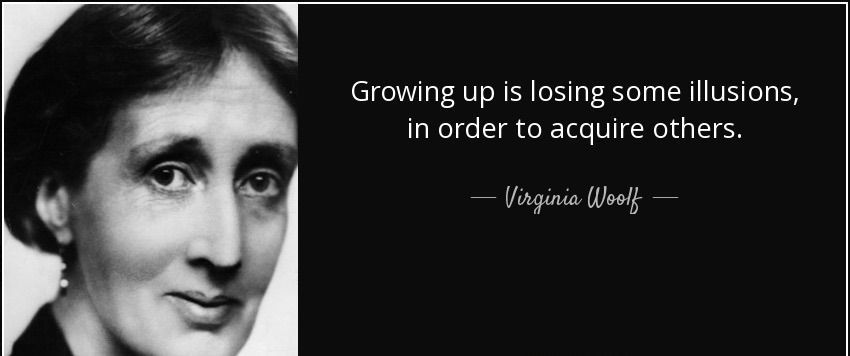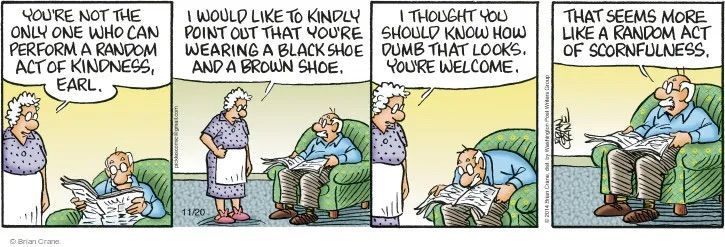Let's talk.
Pub Theology is an open and honest conversation about life, faith, ethics … and a beer or two. Seekers, skeptics, believers, whatever your faith background or tradition, all are welcome. No pressure, no preparation, no pat answers. Just good talk.
We meet Tuesday evenings from 7 - 8:30 p.m. at Irish Tavern in downtown Lake Orion, during the program year.
Discussion topics are posted here typically on Monday afternoons.

We're building our conversation this week around the above quote, that has widely been attributed to English modernist writer and feminist pioneer Virginia Woolf. Before you ask, yes, we are aware that some of Woolf's views, especially on race and class, would make her persona non grata in certain circles today. But that said, the quote is worth thinking about. In some ways it is reminiscent of a quote from C.S. Lewis that was the focus of one of our conversations some eight years ago. Lewis said: "When I became a man I put away childish things, including the fear of childishness and the desire to be very grown up." What both writers seem to be pointing to is the obvious truth that as we age we grow and change. Including our views, our ideas of how the world works, our preconceived notions of ourselves and others. And sometimes that change will feel like loss. What takes the place of those things we've lost? For Woolf, it's other illusions. This brings us back to Woolf's quote. What do you think she is getting at here? Are there illusions that you've had to lose as you've grown older and (hopefully) wiser? What might those be for you? And what about the other half of the quote? What kind of new illusions have we acquired as we've shed others? Finally, are there "comforting illusions" that you still cling to? And to make it a little provocative, is your faith one of them? Come help us sort it all out tomorrow evening. Join us for the discussion Tuesday, Feb. 24 starting at 7pm at Irish Tavern in downtown Lake Orion.

Every now and again we dip into the archives to bring back a topic from a past discussion. When you've been doing this for more than a dozen years, there's plenty of good stuff to revisit. So we're doing that this week, and it turns out to be a surprisingly timely decision. Next Tuesday marks Random Acts of Kindness Day (yes, really), and it turns out that nine years ago, almost to the very day, our conversation revolved around the idea of random acts of kindness. Since we last talked about it, the idea of random acts of kindness has become surprisingly institutionalized. According to the Random Acts of Kindness Foundation , which actively encourages just such things, "When we choose kindness, our brains light up with oxytocin, dopamine, and connection; reminding us that kindness is not just good for the world, it is good for us." And almost 250,000 people worldwide have signed up with the foundation as RAKtivists, pledging to try to make the world a better place one act of kindness at a time. For its part, the foundation, which aims to make kindness a norm, offers kindness tips and suggestions, creates teaching materials, and encourages kindness in our schools, homes, and in our workplaces. For example, when on social media they suggest: "Scroll until you see someone's creative effort -- a drawing, recipe, a photo -- and leave a genuine, specific compliment." To be honest, that sounds like a really nice idea! Here's the prompt from our discussion way back in 2017: In 1982 Anne Herbert wrote the phrase "practice random kindness and senseless acts of beauty" on a restaurant placemat in Sausalito, Calif. Since then, the call to practice random acts of kindness has become firmly rooted in our social culture. So what's an example of this? When's the last time you were on the receiving end of a random act of kindness? What did that feel like? When was the last time you performed one? How did that make you feel? Is such a gesture really meaningful, or is it a way to avoid making kindness a part of our everyday lives and routines? Join us for the conversation tomorrow evening, Tuesday February. 10 starting at 7pm. We gather at Irish Tavern in downtown Lake Orion.

Just when I thought we had exhausted the possible universe of discussion topics about all the various and troubling ways that artificial intelligence technologies are promising to reshape the human experience (and rarely are these for the good) I come across another example that makes my head spin. This one is populated by what are called "deadbeats" being built by companies in what is coming to be known as the "digital-afterlife industry." There's a long article over at The Atlantic's website ( click here for a gift link to the story ) that goes into detail about the people and the companies developing the products that in some cases promise to make grief obsolete by giving users AI chatbot versions of deceased loved ones -- for a monthly subscription fee, of course. Or, in industry parlance, access to AI "deadbot" versions of those loved ones. And it seems that this is a lucrative technology. In 2024, the industry was valued at more than $22 billion, a sum expected to more than triple in less than 10 years. There are a lot of questions that emerge as we think about what all of this means for the way we experience grief and loss: "'Deadbots,' as these posthumous AI creations are known, promise to replace the dead, and the way they are remembered. This raises plenty of ethical issues, not least the extent to which turning deadbots into marketable products will rely on exploiting people in mourning. But perhaps the biggest question is how such a product might shift our experience of personal grief and collective memory. Is grief merely a painful human shortcoming that we haven’t learned to optimize our way out of yet, or does it have a purpose?" As the article makes clear, this technology is very different from the familiar ways we have come to memorialize those we have lost, whether through portraiture, literature, memoir, and so on, which are interpretive expressions of the living's memories of the dead. Instead, "Interactive griefbots are generative, producing “new utterances, new reactions, even new ‘memories’ and ‘behaviors,’ all under the guise of the deceased,” she said. This shift from representation to emulation presents a new ethical line, one that may require new legal protections. Both death and grief are states of profound vulnerability, she warned; the dead cannot stand up for their own interests, and the bereaved may not be in a psychological state to protect themselves from financial manipulation by a company incentivized to prolong their grief. One company, called You, Only Virtual, or YOV, says its point isn't to make grief easier, but rather to bypass it altogether. The company launched with the tagline, "Never have to say goodbye," and promises a user experience that will make you feel as if your loved one never died. In other words, they are promising not to capture every aspect of the person who has passed, but instead to capture how the user felt with that person when they were alive. The point of the interaction is "about inducing the emotions of the living, not imitating the emotions of the dead." We're going to talk about all of this in our conversation this week. Not just about the technology, but about grief itself, how we experience it, and what grief does to and for us. Read the article by clicking on the link above, then join us for the discussion this Tuesday, Feb. 3, starting at 7pm at Irish Tavern in downtown Lake Orion.
